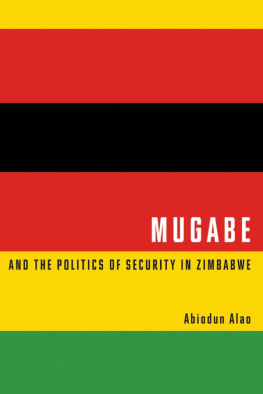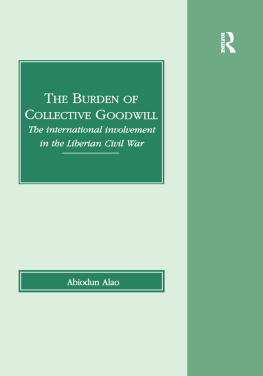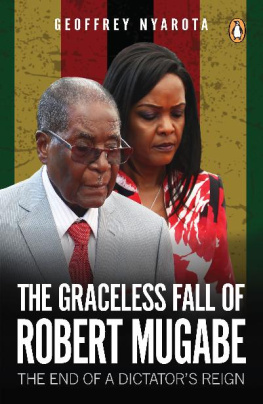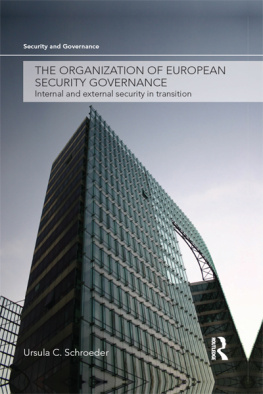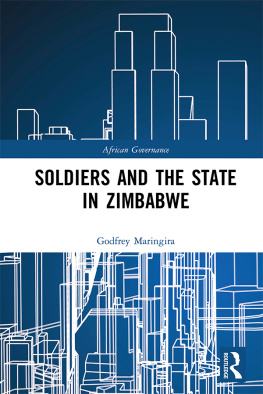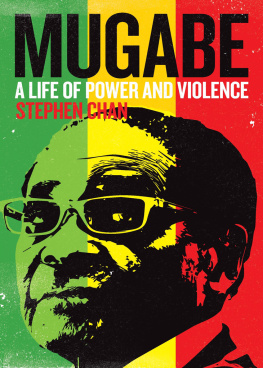McGill-Queens University Press acknowledges the support of the CanadaCouncil for the Arts for our publishing program. We also acknowledgethe financial support of the Government of Canada through the CanadaBook Fund for our publishing activities.
Mugabe and the politics of security in Zimbabwe / Abiodun Alao.
Includes bibliographical references and index.
ISBN 978-0-7735-4043-9 (bound). ISBN 978-0-7735-4044-6 (pbk.)
1. Mugabe, Robert Gabriel, 1924 2. National security Zimbabwe
History. 3. Zimbabwe Foreign relations 1980- 4. Zimbabwe Politicsand government 1980 I. Title.
DT2996. A52 2012 968.9105'1 C2012-904002-9
This book was typeset by Interscript.
Preface
Just as I was completing the writing of The Tragedy of Endowment,my book on natural resources and conflict in Africa, Zimbabwe gotinto the news for all the very wrong reasons: acrimonious racialrelations, controversial elections, economic hardship and massiveinflation, intervention in the Democratic Republic of Congo (DRC),suspension from the Commonwealth of Nations, alleged humanrights violations, and so on. A colleague who knew of my interest inZimbabwe during my previous life as a doctoral student at KingsCollege London in the late 1980s asked me the extent to which allthese developments were predictable when, in 1980, the countrysindependence was received by the world with euphoria. This got methinking seriously about the situation in Zimbabwe immediatelyafter I completed The Tragedy of Endowment. By the end of 2008,Zimbabwes situation seemed to have worsened: economically, inflation had further increased, reaching one of the highest of any country in recorded history; politically, the possibility of a government ofnational unity to bring together the ruling party, the ZimbabweAfrican National Union-Patriotic Front (ZANU-PF), and the opposition, the Movement for Democratic Change (MDC), had dimmed;and socially, tension was rising among the population. A major cholera epidemic compounded the problem, claiming up to three thousand lives. All this had put a lot of pressure on the country and onthe government of President Robert Mugabe. On the whole, in thecontext of local and international developments, it seemed clear bythe end of 2008 that the days of President Mugabe as the sole determinant of all aspects of Zimbabwes affairs were numbered and thatthose numbers were very few indeed. By February 2009, a chapterclosed in the history of the Southern African nation, if not in practiceat least in theory, with Mugabes acceptance of the inclusion of theopposition MDC in the government and the swearing in of his archenemy, Morgan Tsvangirai, as prime minister. The closure of thischapter thus calls for an in-depth examination of different aspects ofMugabes twenty-eight years of sole power in the Southern Africannation an examination that will continue once he finally leavesoffice. This book, which looks at the way Mugabe handled the countrys security during this period, is one attempt at this.
But the subject of security in Zimbabwe is extraordinarily complex,involving virtually all other subjects, including politics, economics,ethno-racial relations, and even property rights. Things are never asthey seem on the surface as every political development in the countryhas security implications, and every security issue has social, economic,and political undertones. However, it would seem that the complexities surrounding the politics of security in Zimbabwe have arisen outof three main factors: (1) the nature of the countrys emergence, especially the war of liberation and the local and international politics thatunderscored its prosecution and resolution; (2) the policies adopted byits inheritance elites, that is, those who took over political governance after independence; and (3) the countrys location at the centreof a region that, for a long time, had a string of peculiar security features. All three considerations, however, have one thing in common:their bearing on national security under President Robert Mugabe the central figure in the politics of security in Zimbabwe.
Throughout the first twenty-eight years, Zimbabwes securityregime was analyzed largely through the prism of the war of liberation. Even after the direct security legacies of the war had beenaddressed, disagreements continued over the extent of the role thewar should play in national thinking and consciousness. Broadlyspeaking, the debate put the Mugabe government, which believedthat the war should be the main yardstick for measuring patriotism,on a collision course with those who felt that it should not. Further,the Mugabe administration believed that the nation should be inperpetual debt to the ZANU-PF due to its sacrifice in liberating thecountry, while there were others who believed that the partys rejection in plebiscites was a clear indication that it should be demystifiedand become aware of the need to moderate its expectations. Thesepositions, as I show later, are crucial factors in understanding thepolitics of security in Zimbabwe.
The way President Mugabe has handled the countrys securitysituation has attracted considerable public interest, and the conclusion often reached is that he started well as a conciliatory leaderbut later changed to become one of Africas most brutal or, putmore mildly, most controversial, leaders. However, a close look atthe security situation in Zimbabwe since independence shows this tobe a weak thesis. Indeed, all the key security issues that gave Mugabethe pariah image he later acquired had occurred earlier but wereignored due to prevailing international politics, overlooked due to areluctance to interfere in the internal affairs of Zimbabwe, or pardoned because it was thought that Zimbabwe had peculiar problemsthat made some forms of excess understandable. For example, theclampdown on the MDC and its leader, Morgan Tsvangirai, had anantecedent in the browbeating of the Zimbabwe African PeoplesUnion (ZAPU) and Joshua Nkomo; the allegation of illegal exploitation of resources during the intervention in the DRC was similar tothe smuggling allegations levelled against the Zimbabwean armyduring its involvement in Mozambique; the use of security forces tointimidate supporters of the MDC had a close resemblance to thedispatch of the 5th Brigade into Matabeleland; the major disagreement with Britain over the Whitehalls reactions to Zimbabwes landpolicy was simply an updated and expanded version of Mugabesreaction to Britains objection to Harares detention of those allegedto have destroyed the Zimbabwe Air Force planes in July 1982.Consequently, the post-2006 developments in Zimbabwe attractedinternational concern not because they were different in intent (oreven in extent) from those ignored in the past but, rather, becausethe nature of international involvement in national governance hadchanged to allow for greater criticism of actions hitherto consideredto be the internal affairs of developing countries. In short, Mugabedid not change his domestic and external security strategies; whatchanged was the way in which the international community interpreted and evaluated them.
Indeed, throughout his first twenty-eight years as leader, Mugabesmain objective was always to exploit every domestic and subregionalsecurity opportunity to consolidate his grip on power, while continuing to exploit the legacies of the past to satisfy his desires in the present. Again, a close look at many of Mugabes policies and actionsclearly shows this. For example, the tactical compromise adoptedtowards the whites shortly after independence, which saw him granta number of security concessions to them; the alliance with ZAPU,which saw the late Joshua Nkomo and a few other ZAPU membersinvited to join the first cabinet; the brutal suppression of theMatabeleland unrest; the forceful occupation of white farms; theintimidating posture taken towards the MDC; the intervention inMozambique; and the controversial involvement in the DRC warmight all seem diverse on the surface, but they were all part ofMugabes determination to take advantage of the past in order toensure a tight grip on national security. Mugabe realized that therecent past could be twisted and exploited to his advantage. Thus, ifthose who suffered during the 198691 Matabeland unrest laterbecame beneficiaries of the lands acquired from white Zimbabweans,it was because they changed their stances to be in line with Mugabes;and if beneficiaries of past favours later fell on hard times, it wasbecause they slipped down Mugabes loyalty scale.

